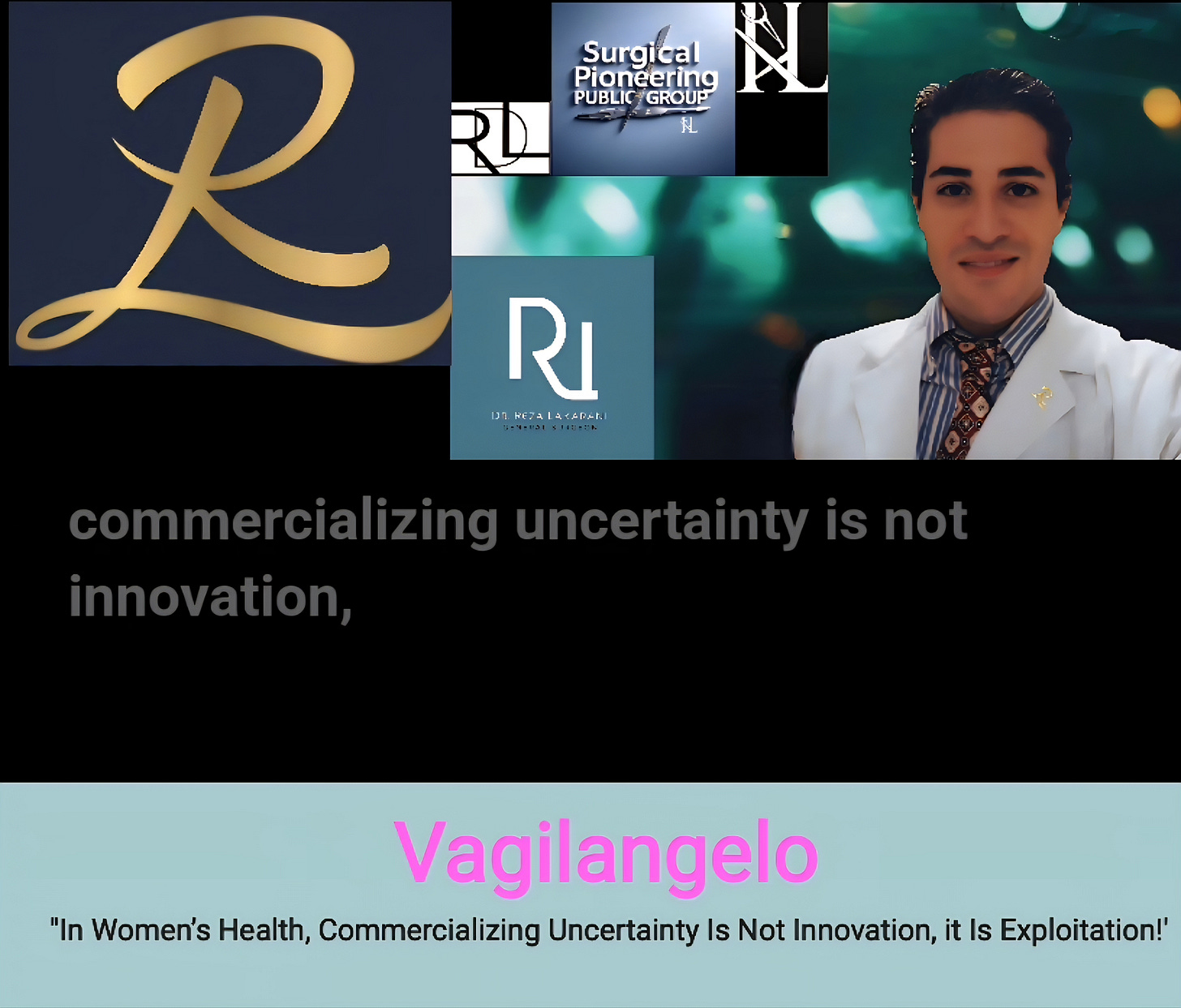The provided sources, primarily critiques from an OBGYN and health disparities researcher, Dr. Reza Lankarani, highlight significant concerns regarding the Vagilangelo® procedure and the broader landscape of cosmetic gynecology, particularly in the context of medical tourism and training in Arab countries. The central theme revolves around the tension between profit-driven healthcare and patient safety, arguing that the commercialization of uncertainty in women's health is exploitation, not innovation.
1. The Vagilangelo® Procedure: Unsubstantiated Claims and Evidence Deficit
The Vagilangelo® procedure, marketed as a revolutionary vaginal rejuvenation technique, aims to restore "natural vaginal angulation" through internal suturing and platelet-rich plasma (PRP) injections. However, the sources assert that its claims are largely unsubstantiated by scientific evidence.
Lack of Peer-Reviewed Validation: Despite claims of "77% satisfaction," Dr. Lankarani's critical review notes: "High satisfaction rates cited are anecdotal... Clinical trials comparing it to established methods would significantly strengthen its standing." The procedure lacks "zero randomized controlled trials," "no longitudinal safety data," and "absence of objective outcome measures (e.g., validated sexual function scales)."
Unproven Biological Mechanisms: The efficacy of PRP for vaginal sensitivity lacks "tissue-specific evidence," and its growth factor concentrations and injection protocols are not standardized. This "scientific overreach" contrasts with established therapies that have documented effects.
Inadequate Structural Correction: Marketing materials state Vagilangelo® provides "less tightening than traditional vaginoplasty," making it unsuitable for significant prolapse or laxity, positioning it as a "solution" for problems it cannot adequately address.
Unquantified Risks: Unlike traditional surgeries with documented complication rates (e.g., vaginoplasty stenosis rates: 5–15% at 5 years), Vagilangelo® lacks published data on intraoperative risks, long-term safety, or pain management. The use of internal sutures poses theoretical risks of "urethral/bladder injury" and "nerve damage."
2. The Exploitative Ecosystem: Medical Tourism and Predatory Training
The sources heavily criticize the "exploitative cosmetic surgery tourism" and "unethically trained practitioners" associated with procedures like Vagilangelo®, particularly targeting vulnerable women in low-resource settings like Bahrain.
Medical Tourism's Hidden Costs: Bahrain's experience shows that its tertiary centers absorb significant costs (175,000 USD annually) treating complications from cosmetic tourism, mostly infections and implant failures. "All-inclusive packages" typically exclude meaningful postoperative care, leading to "patient abandonment" and an "economic drain" on local healthcare systems.
Unethical Training Paradigms: The rise of "short-course 'fellowships'" (e.g., 3-5 day "certification" programs in Arab countries) enables this crisis. These programs lack "standardized curricula" and bypass the 1-2 years of supervised training required for legitimate surgical fellowships. They are accused of "targeting vulnerable populations" and allowing "underqualified surgeons operating on poor women," which is deemed "ethical malpractice."
Commercialization of Insecurity: Vagilangelo® marketing is seen as violating core bioethical principles by prioritizing profit over documented clinical benefit. Patients cannot provide meaningful consent due to a lack of outcome data, and the high cash-pay cost ($3,000+) excludes low-income women who might need functional repair.
3. Ethical Violations and Health Disparities
The commercialization of procedures without robust evidence is seen as contributing to global health inequity and ethical failures.
Autonomy Violation: Patients cannot provide meaningful consent without comprehensive, evidence-based information on risks and benefits.
Justice Failure: The high cost excludes low-income women who might benefit more from affordable, evidence-based functional repairs.
Beneficence Abandonment: The emphasis on profit over documented clinical benefit is a betrayal of the medical principle of beneficence.
Regressive Healthcare Subsidy: Public hospitals bear the burden of complications from offshore cosmetic procedures, effectively subsidizing a profit-driven industry.
4. Policy Recommendations: Toward Ethical Practice
The sources propose a multi-faceted approach to address these issues, emphasizing regulatory harmonization, patient safety integration, and ethical commercialization.
Evidence and Regulation Reform: This includes an "immediate moratorium on Vagilangelo® marketing pending RCTs," standardization of outcome measures by professional bodies (e.g., ACOG/FIGO), and "FDA-equivalent oversight of PRP preparation protocols."
Training and Equity Measures: Recommendations include a "global ban on <3-month cosmetic surgery 'fellowships'," mandatory registries for surgeons performing vaginal rejuvenation, and reallocating medical tourism revenues to fund public pelvic floor programs.
Patient Protection Framework: This involves "mandatory complication insurance for medical tourism packages," culturally adapted decision aids, and publicly funded pelvic rehab access.
Regulatory Harmonization: "GCC-wide bans on the three-month fellowships and standardized accredititation" are crucial.
Patient Safety Integration: Embedding WHO's 11-topic safety curriculum (e.g., error disclosure, teamwork) into all programs.
Ethical Advertising Laws: Enforcing penalties for misleading claims, as piloted by Saudi Arabia's GMR.
In conclusion, the sources argue that "Specialized training is non-negotiable for complex care." They emphasize that "Only by replacing expediency with rigor can cosmetic training align with medicine's premium non-nosier ethos." The overarching message is clear: "In women's health, commercializing uncertainty is not innovation. It is exploitation." The call to action is to prioritize "evidence before implementation," "training before trespass," and "equity before economics," rejecting "industry-backed hype" in favor of "science and human dignity."
Cosmetic Gynecology Exploitation
This timeline integrates information from the provided sources to offer a comprehensive overview.
Pre-Vagilangelo Era (Prior to its marketing):
Ongoing Trend of Medical Tourism: Patients, particularly from Bahrain, travel to countries like Iran, Egypt, and Turkey for cheaper cosmetic procedures, often leading to complications that burden their local healthcare systems.
Development of Established Vaginal Rejuvenation Techniques: Surgical vaginoplasty, laser/RF therapies, and pelvic floor physical therapy exist with varying levels of evidence and known risk profiles.
Existence of "Short-Course Fellowships": Dubious academies in Arab countries offer very brief (3-5 day) "certification" programs in cosmetic surgery, lacking standardized curricula or rigorous oversight, in stark contrast to legitimate, longer fellowships.
Introduction and Marketing of Vagilangelo®:
Development of Vagilangelo®: Dr. Amir Marashi develops the Vagilangelo® procedure, marketed as a revolutionary vaginal rejuvenation technique involving internal suturing and PRP injections to restore "natural vaginal angulation."
Aggressive Marketing Campaigns: Manufacturer websites and testimonials are the primary source of claims for Vagilangelo®, asserting "77% satisfaction" without peer-reviewed studies. Marketing targets postpartum women by commercializing body insecurity.
Lack of Scientific Validation: From its inception, Vagilangelo® lacks randomized controlled trials, longitudinal safety data, and objective outcome measures, violating fundamental principles of evidence-based medicine. The PRP component also lacks tissue-specific evidence and standardized protocols.
Concerns and Critiques Emerge:
Dr. Reza Lankarani's Critical Review (Specific Date Unspecified, but before or concurrent with the primary source publication): Dr. Lankarani publishes a critical review highlighting the anecdotal nature of Vagilangelo®'s satisfaction rates and the need for clinical trials.
Observation of Complications (Bahrain): A Bahraini tertiary care center observes and treats numerous complications from cosmetic tourism, including infections and implant failures, incurring significant annual costs (approx. $175,000 USD). This highlights the burden of poorly performed procedures on public health systems.
Growing Concerns over Unethical Training: The proliferation of short-course "fellowships" directly enabling undertrained practitioners to perform procedures like Vagilangelo® becomes a significant ethical and safety concern.
Ethical Violations Highlighted: Critics point out autonomy violations (lack of informed consent due to absent data), justice failures (high cash-pay cost excludes low-income women), and beneficence abandonment (prioritizing profit over documented clinical benefit).
Call for Action and Policy Recommendations:
Advocacy for Regulatory Harmonization (GCC-wide): Proposals are made for bans on "fellowships" shorter than three months and standardized accreditation across Gulf Cooperation Council (GCC) countries.
Demand for Enhanced Oversight and Accountability: Suggestions include national accreditation bodies (like Saudi Arabia's SAPSB and GAMR) enforcing transparency in advertisements, penalizing unaccredited programs, and mandating adverse event reporting systems.
Ethical Commercialization Policies Proposed: Ideas emerge to tax medical tourism profits to fund legitimate fellowships in underserved regions and develop global academic partnerships to replace exploitative training models.
Emphasis on Patient Safety Integration: Recommendations include embedding WHO's 11-topic safety curriculum into all medical programs, focusing on error disclosure and teamwork.
Call for Evidence-Based Practice: Demands are made for an immediate moratorium on Vagilangelo® marketing pending rigorous randomized controlled trials and ACOG/FIGO standardization of outcome measures for vaginal rejuvenation procedures.
Global Bans and Registries: Calls for a global ban on cosmetic surgery "fellowships" under three months and compulsory registries for surgeons performing vaginal rejuvenation.
Ongoing Situation (Implied):
Commercialization of Uncertainty Continues: The practice of marketing unproven procedures and the existence of short-term, unethical training programs persist, contributing to healthcare inequity and patient harm.
Advocacy for Ethical Practice: Researchers and clinicians continue to highlight the need for evidence before implementation, rigorous training before practice, and equity before economics in women's healthcare.
Cast of Characters
Please note: The sources primarily focus on the ethical and scientific issues rather than personal narratives, so bios are limited to the information provided.
Organizations/Groups with Significant Roles:
Saudi Arabia’s SAPSB (Saudi Commission for Health Specialties) and GAMR (General Authority of Media Regulation):
Role: National accreditation and regulatory bodies in Saudi Arabia.
Bio: Referenced as potential enforcers of transparency in advertising, penalties for unaccredited programs, and ethical advertising laws. They are key players in the proposed regulatory solutions to improve medical training and advertising standards.
WHO (World Health Organization):
Role: International health authority.
Bio: Mentioned in the context of its 11-topic safety curriculum, which is recommended to be embedded into all medical programs to improve patient safety competencies like error disclosure and teamwork.
ACOG (American College of Obstetricians and Gynecologists) / FIGO (International Federation of Gynecology and Obstetrics):
Role: Leading professional organizations in obstetrics and gynecology.
Bio: Cited as potential bodies to standardize outcome measures for vaginal rejuvenation and establish consensus on patient selection criteria, thus contributing to evidence-based practice and ethical guidelines.
FEBS (Federation of European Biochemical Societies):
Role: European organization setting standards for biochemical societies.
Bio: Referenced as a benchmark for legitimate fellowship requirements, specifically for their mandatory minimum durations (2-3 months) for supervised skill integration, contrasting with the much shorter, dubious "fellowships."
ISAPS (International Society of Aesthetic Plastic Surgery):
Role: International professional body for aesthetic plastic surgeons.
Bio: Mentioned in the context of legitimate fellowships (e.g., 3-month fellowships requiring supervision), providing a contrast to the unstandardized short-course programs.


















Share this post